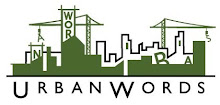You can now download a transcript of the paper I gave at Playing in Urban Places at Leeds Metropolitan University on 3rd October from A Place For Words.
Just to blow my own trumpet for a moment, some unsolicited emails after the event:
"I wanted to say how much we enjoyed your presentation, it was brilliant, interesting and inspiring"
"I really enjoyed your talk "
I'd be interested to hear what anybody thinks about it...
Subscribe to:
Post Comments (Atom)


4 comments:
Thanks for the paper, it is very interesting and well written (I wish I could write like you). I have a couple of theoretical reservations, but are minor points. It is striking the similarities of our subjects and references, hope to read more in future. paolo[at]kiddingthecity[dot]org
Thanks Paolo
I'd be interested to hear the theoretical reservations... I'm still formulating my ideas so interested to think through them and hear different views.
Sarah
A couple of things very quickly... you said that the public place has to become an open arena. I ask: who is legitimate to perform in there? what kind of moral authority decides for the actors to be authored?
And something about the literacy involved in the regeneration (words vs pictures, for instance): who can write and keep the head up for the 'spelling'? who possess the vocabulary for doing art?
Said that, I am very much in the process of making my way through the scholarship and have more doubts and questions than answers.
all the best,
paolo[at]kiddingthecity[dot]org
Thanks Paolo,
I agree the issue of who is ‘allowed’ to perform in public space is a crucial one. I want to say anyone, but does that work in our society? What if one group takes ownership to the detriment of another – I’m not sure. But my concern is about the privatisation of public space, so you have places like Peninsula Square on the Greenwich Peninsula with security guards who have the right to remove people if they’re being a ‘nuisance’ – but who decides what ‘nuisance’ means? So much of it is about the power of language and the interpretation of words I think.
Can you expand on the literacy point a bit more? I’ve been thinking a lot about the communication gap between regeneration professionals and ‘communities’ – but I’m not sure that’s what you mean? Or is it more a response to my idea that writers can collaborate with people to create work that is accessible and valued by all parties? And does that throw up issues around who creates the art?
Sarah
Post a Comment